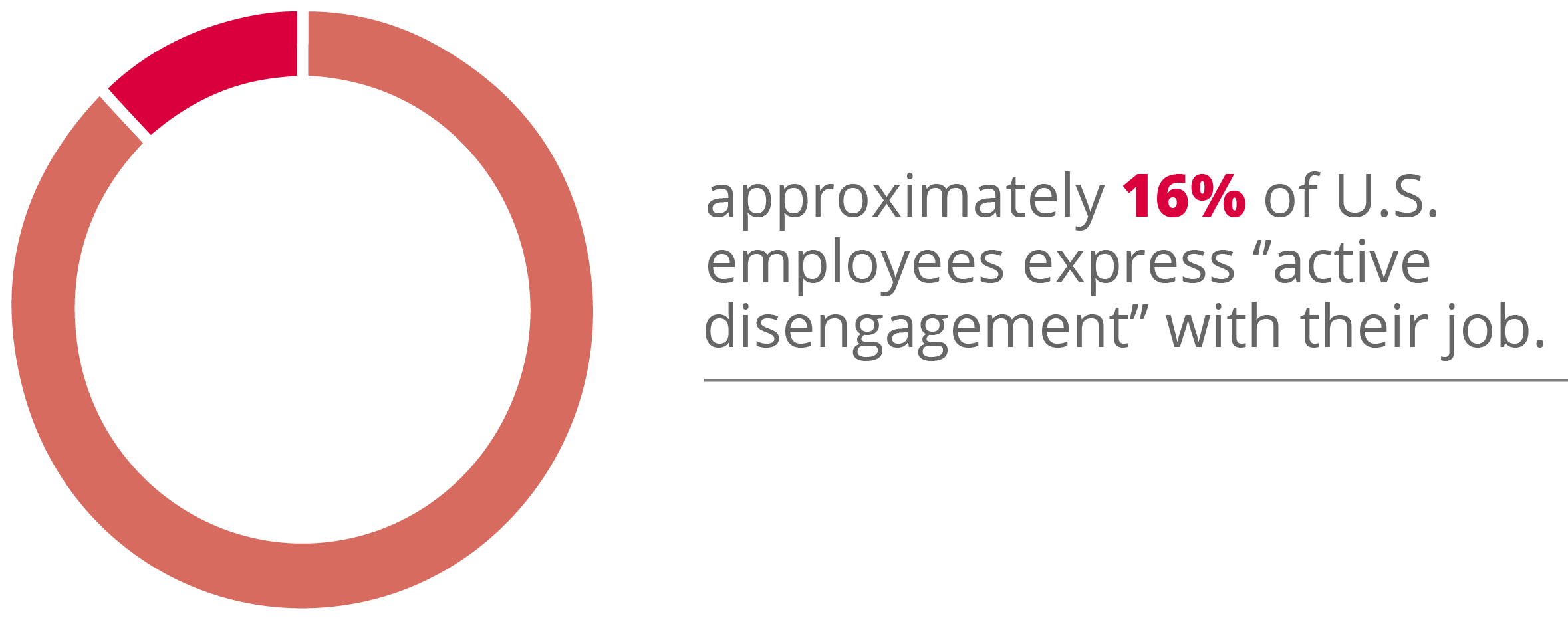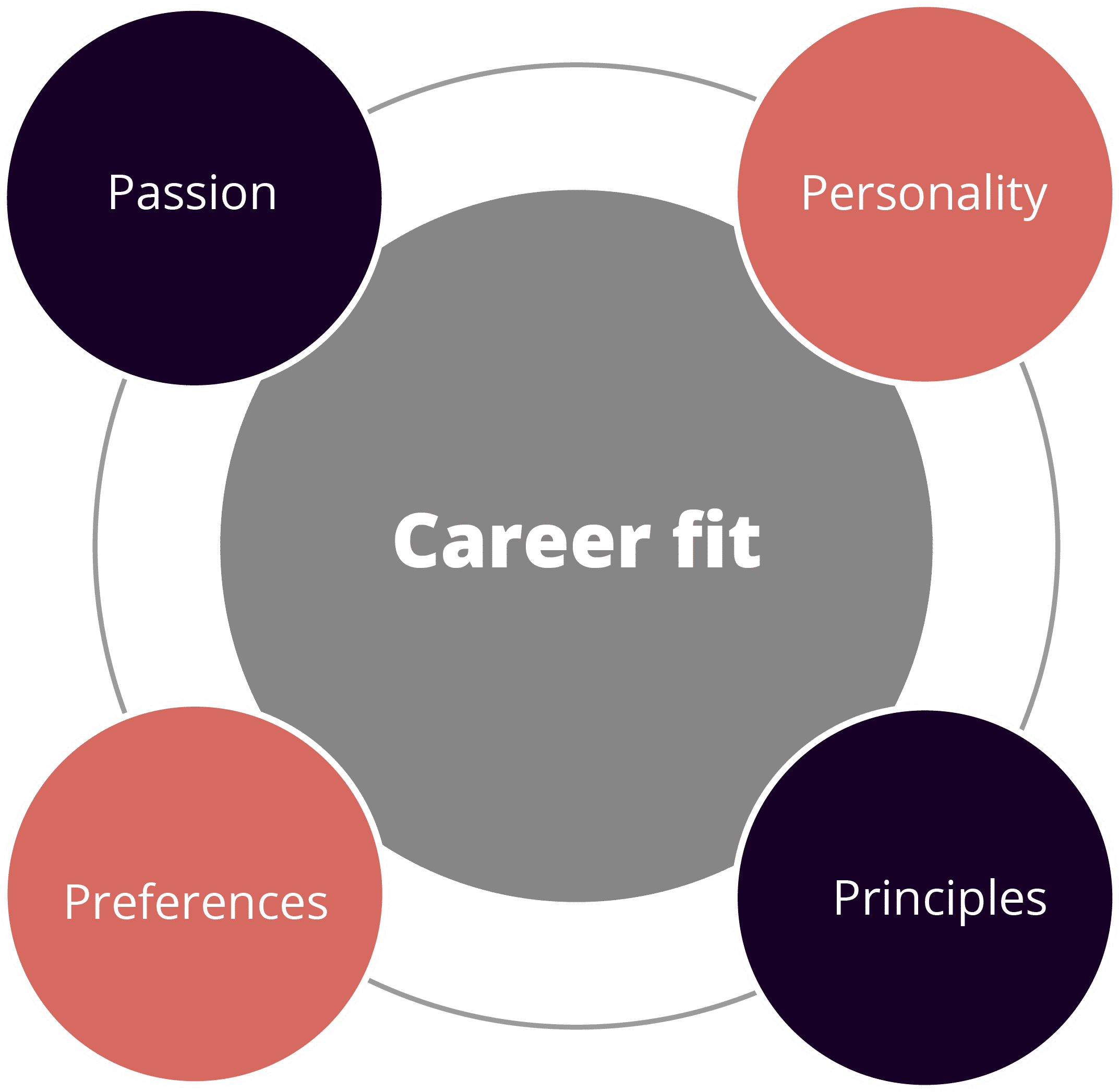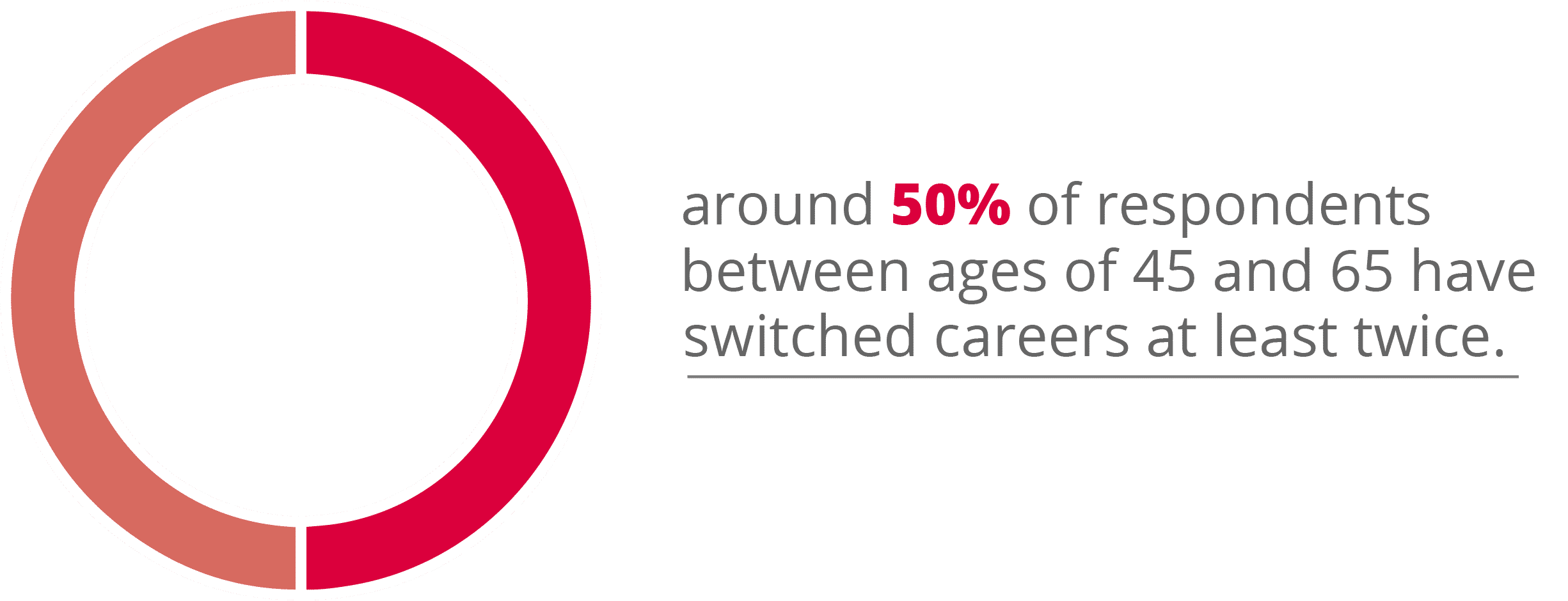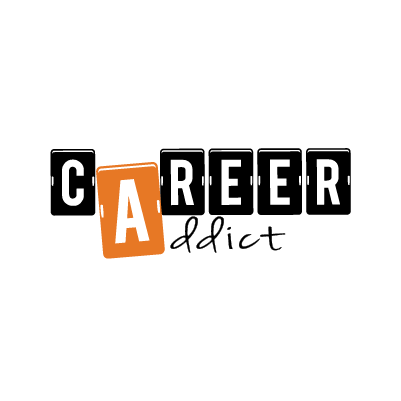One of the most pressing questions a person will ask in their life is about their career.
Human beings naturally strive for meaning in their lives and for many, building a career is a way to achieve self-actualization, the highest level in Maslow’s hierarchy of human needs.
Indeed, for many people, a career is much more than just a way to pay the bills.
Careers offer meaning, purpose, drive; a reason to get out of bed in the morning and the satisfaction of knowing what you are doing aligns with your deepest passions and makes a difference in the world.
Of course, anyone in the working world knows that picking a career is an extremely hard thing to do.
Many people spend years cultivating a skill set and working in a particular field before they realize they would much rather be doing something else for their careers.
The sheer number of potential career paths and the general uncertainty surrounding success in a particular career field produce much anxiety in the working class.


So career uncertainty is more than just a personal psychological issue; it greatly affects how students handle their education.
Many websites focusing on career guidance recommend that people searching for a career take one of the numerous career aptitude tests that exist, such as 123 Career Test or the Princeton Review Career Aptitude Quiz.
We take a different approach. In our view, career tests are too surface level and nowhere near precise enough to assess the deep skills and interests that are relevant to picking a career.
At best, they can tell you what careers your skills might be suited for; they cannot help you find your passions or make you care about a particular field of work.

According to a recent Gallup survey, around 51% of the approximately 100 million full-time employees in the United States express dissatisfaction with their job or express that they feel disengaged with their work. Further, 16% of those employees express “active disengagement,” meaning they feel resentment for their jobs [2].

These feelings of dissatisfaction seem to be more pronounced in those who work low-paying, low-stability jobs, such as retail, service, and manual occupations.
Three out of ten workers describe their work as “just a job to get by,” indicating a general lack of passion or connectedness to their work.
Obviously, these feelings of dissatisfaction probably have something to do with rising economic inequality and the fact that wages have been stagnant for some time [3], once inflation has been accounted for.
A large part of the dissatisfaction is due to poor bosses and bad management practices, while part of the dissatisfaction can likely be attributed to personal feelings about the worthwhileness of one’s job.
In short, working in a job/career that you feel no passion for is not only bad for you mentally and physically, but it is also bad for the economy in general.
Unmotivated and disgruntled workers are less productive and cause problems in the workplace, regardless if they have legitimate reasons to be unhappy with their working conditions. Poor work performance leads, as expected, to lower economic returns.
Although this article is titled “12 Steps to Find Your Career Path” you, dear reader, should not take this list as a determinate set of rules to follow to find your career. In reality, there is no one-size-fits-all approach to finding meaningful work. Rather, readers should take this list as a set of guidelines that offer a jumping-off point to finding a satisfying career.
Hopefully, these steps and tips can give you some clarity during your career search.
12 Steps to Finding Your Career Path
1. Make a List of Your Interests
We know, it sounds basic and unhelpful, but you would be surprised how many people never actually sit down and ask themselves what kinds of things they are interested in.
When searching for a career, many people put money as the no. 1 determinant for picking a job and rarely stop to seriously consider if they are actually interested in the positions that make more money.
That is why it helps to sit down and write out a list of all your options, which can include tangible job opportunities, your education, career paths, and any interests and passions you have.
When we say “write out a list,” we mean to literally sit down with a pencil and some paper and physically hand write a list.
There is a growing body of evidence that seems to suggest handwriting helps with mental processing and can make people integrate concepts differently than just thinking about them or even typing them on a computer [4].
Physically writing down your thoughts provides a different way to process mental content, which can better help you realize your passions and interests.
Once you write your list, take some time to go through and rank your options from best to worst. Of course, this ranking will be based on different criteria for everyone; perhaps you value autonomy and personal interaction the most in a career or maybe you enjoy more technical disciplines that require a level of abstract analysis.
Try to figure out some pros and cons for each item on your list. For example, if being a surgeon is on your list, some pros might be helping people, contributing to public health, or even the cognitive challenge of being a doctor.
Some cons could be the monetary investment, the long time spent in school, and the demanding work hours.
Again, these sorts of rankings depend on the individual’s professed values and will be different for different people.
The point is not to figure out what everyone else thinks about a career path, but what you, personally, feel about it.
Obviously, you can go back and make changes to this list the more you think about it.
2. Ask Working Professionals
Once you have your tentative list, consider reaching out to professionals to get their feedback on what it is like to work in a specific field.
Unfortunately, many people’s perceptions of careers are based on media representations, which, among other things, are often inaccurate pictures.
For example, you might hear about all the great benefits of working as a writer, such as a flexible schedule, autonomy, laid-back atmosphere, and self-direction.
However, you rarely hear about the less fun parts of the writing career, such as applying for multiple gigs a day, dealing with difficult clients, and handling potentially confusing taxes.
Because public perceptions are often inaccurate, you need to get an insider’s perspective on a particular career path.
Moreover, working professionals can give you tips and advice on how to get into and succeed in a particular career.
Figuring out the realities of a career path from those in-the-know can help you root out choices if they do not actually line up with your values and passions.
3. Volunteer
Another way to get a better understanding of a career path is to volunteer at an institution related to that line of work.
Now, we understand that not everyone has the luxury to volunteer their time for free.
Volunteering might get you a good experience, but experience alone does not pay the bills.
According to the Bureau of Labor Statistics, individuals between the ages of 35 and 54 are the most likely to volunteer their time, and these people are more likely to already be settled into a career and have the financial stability necessary to volunteer their time [5].
However, if you can handle the extra commitment, volunteering is a fantastic way to get some insider knowledge of a career path.
Sure, as a volunteer you will likely not be doing anything incredibly important, but it can give enlightening knowledge on what it is like to work in that career field and what daily tasks will be expected of you.
Volunteering is a great way to get your foot in the door and make professional connections in a particular industry. It will also help you build up the relevant skills and experience which will make you a more attractive applicant during the hiring process.
4. Assess Your Skills and Look for Overlaps
Assessing a career based on job titles can be extremely misleading.
Very often, job titles alone do a very poor job of indicating what the nature of a particular position actually is.
What companies need, what you are good at, and what you like to do may all be different things, so it is important to find career options that strike a suitable balance between all three.
It helps to think about previous employment to inform your future career desires.
- What did you like about your previous jobs?
- What did you not like?
- Which tasks did you feel provided you with the most satisfaction?
- Which personal qualities do you feel helped you succeed in those positions?
- What qualities did you feel were a detriment to performance?
To be sure, looking for a career requires some soul-searching and honest self-assessment.
You may initially think that you are an organized person, but objectively looking at your past job performance may indicate otherwise. The key to finding a satisfying career is to objectively assess your skills and personality and look for careers that have the biggest overlap in those factors.
You should not feel discouraged if analysis shows you lack a particular skill set or personality trait that you thought you had. The benefit of finding these weaknesses is twofold; it (1) gives you something to work on in the future and (2) helps you find career paths best suited to your talents.
5. Consider the Required Education/Certifications
Most careers nowadays require at least some amount of formal education.
Your career search should be sensitive to the amount and level of education required by the profession.
You may dislike school with a passion, but if you want to become a doctor, you’re out of luck as becoming a doctor requires years of expensive and intensive schooling and training.
Other career paths, such as massage therapy, require a relatively smaller investment in formal education.
So when looking for a career, you need to seriously ask yourself how much work you are willing to do to prepare for and continue along that path.
If you are not interested in pursuing a long formal education for a particular career path, you may be able to find a career that has a similar purpose and structure but that does not require years of education.
For instance, if you are interested in working in the legal field, but can’t afford the monetary/time investment for law school, perhaps a career as a paralegal or legal assistant would be a good fit.
That way you can get the big picture aspects that you like about the legal field without the years of expensive education needed to become a practicing attorney.
6. Take Some Career Tests
Career assessment tests alone are a relatively weak indicator of careers that are likely to lead to satisfaction.
However, they can be very useful for self-assessment and for turning you on to career paths that may interest you.
When thinking about your future career, it helps to take a handful of career assessment or career aptitude tests.
Here are 5 of the most popular career aptitude tests:
- Myers Briggs Type Indicator
- Self-Directed Search
- MyPlan.com
- MAPP Career Assessment Test
- The Big 5 Personality Test
The basic gist of these kinds of career assessment tests involves asking questions about your personality and interests, which are then mapped to a pool of potential careers.
To be clear, these tests only match you to careers based on your professed skills and interests.
They do not necessarily consider things like your ethical principles, or what kind of lifestyle you want to lead.
For instance, the Myers-Briggs Type Indicator tells you what your personality preferences are; things like what energizes you, how you learn, and your decision-making processes. In that sense, they can be a good way to match you with career paths, but they should not be taken as gospel.
7. Passion is Not Everything
A commonly touted piece of advice for choosing a career is to “follow your passion.”
While finding something you are passionate about certainly is important, it is not the end-all-be-all of your career search.
Career satisfaction is not just about the passion you feel for a line of work, but about career fit.

Career fit is about the four P’s—Passion, Personality, Preferences, and Principles.
Finding the right career is about making sure that the career path lines up with these 4 four P’s.
For example, say you decide you want to be a psychotherapist because you believe that will best serve your passion for helping people.
However, say that you have a driven personality that is suited for a fast-paced, ever-changing environment that requires you to work on challenging projects.
While psychotherapy may fit your passion for helping people, the reality of sitting in a chair for 8 hours a day listening to peoples’ problems may be at odds with your action-oriented personality.
So while psychotherapy may align with your passions, it may not necessarily sync up with your personality.
Likewise, while you may feel that a particular career serves your passions, you may find your personal principles at odds with the realities required by the job.
For example, say you have a passion for building things and developing new technologies.
However, you realize that many of the technologies you will help develop will be used in military applications.
While you certainly have a passion for engineering, working in such a field may go against your personal and ethical principles.
In fact, evidence suggests that the perceived ethicality of a company’s organizational structure is extremely important with respect to worker satisfaction [6].
In other words, employees who find that their company’s ethical values line up with their own are more likely to express high levels of job satisfaction, while those who feel that their ethical values do not line up with those of their employers express higher levels of job dissatisfaction.
In short, while passion is definitely an important factor to consider during the career search, it should not be the only thing you consider. You also need to consider your individual personality, preferences, and principles to find a good career fit.
8. Be Open to “Unconventional” Careers
If you ask a third-grader what career they want to follow, odds are you will hear the usual suspects—doctor, lawyer, astronaut, police officer, etc.
There is a reason careers such as these are a popular option for many people. They are public-facing positions that receive much praise in society and the media.
However, if the “normal” choices for career paths do not appeal to you, there are tons of “unconventional” careers you can investigate.
For example, did you know you can get a job as a professional water slide tester? In fact, water slide testers face great entry-level salaries that most people would be happy to accept, to the tune of $31k a year! Likewise, you can get a job as a Netflix Tagger, meaning you get paid to watch a ton of entries on Netflix and categorize them for their search algorithm.
You can even become a professional luxury bed tester and essentially get paid to sleep on fancy mattresses.
Now to be fair, many of these “unconventional” careers probably don’t pay as much as established careers such as doctors or lawyers, and they may not be as in-demand in certain locations.
However, making a living as a private island caretaker, for example, offers a kind of experience that money just cannot buy.
Especially in today’s ever-changing global economy, there is always some new career field popping up somewhat unexpectedly.
Who could have predicted 20 years ago that there would be an entire industry based around vlogging online or an entire industry around making apps for walking dogs?
If the past 30 years of the changing labor landscape have taught us anything, it’s that you can make a career out of almost anything if you are smart and diligent about it.
9. Listen to the Job Forecast
Contrary to the conventional wisdom that labor markets self-regulate themselves, many careers are really bad about policing themselves.
For example, lawyers have traditionally enjoyed solid and stable careers, but currently, we are experiencing a high glut of lawyers even when there are not many jobs for lawyers available. In fact, many law school graduates end up not actually practicing law, even if they do find jobs in related legal professions.
That is why it is important to tailor your career search to professions that are expected to see growth in the future.
According to the Bureau of Labor Statistics’ most recent Occupational Outlook Handbook, the following 10 professions are expected to see the most growth in the following decade.
- Solar photovoltaic installers (105%)
- Wind turbine service technicians (96%)
- Home health aides (47%)
- Personal care aides (37%)
- Physician assistant (37%)
- Nurse practitioner (36%)
- Statisticians (33%)
- Physical therapist assistant (31%)
- Software developers (31%)
- Mathematicians (29%)
According to this analysis, renewable energy, healthcare, and computer science seem to be the three industries expected to see the most growth in the next decade.
While it may seem somewhat cynical to base your career search on an abstract economic forecast, it is hard to justify putting in the time and effort to become a printing press operator, for example, when the general trend seems to be shifting from printed pages to computer displays.
In our fast-paced technologically changing society, even jobs that have experienced recent amounts of growth, such as computer programming, can fall to the wayside rather quickly.
So when looking for a career, make sure you are taking into account the economic forecast for certain professions. Granted, it can be very hard if not impossible to determine without a shadow of a doubt that a particular career is dying, but it is something to keep in mind while searching.
This inherent instability of labor markets can be a positive thing. It means that, when it comes to work and careers, nothing is set in stone.
10. Consider Potential Income
We hate to say it, but the fact of the matter is that potential income is important to consider when looking for a career.
It is often said that “money can’t buy happiness.” While this is true on a big-picture scale, it will be hard to achieve life satisfaction in a career that cannot pay the bills.
To be sure, the relationship between income and happiness is non-linear and above a certain point, higher income has diminishing returns with respect to self-reports of subjective well-being [7].
However, under that point, income and overall life-satisfaction share a moderate positive correlation.
The key here is not to judge a career based on the absolute income it can generate, but whether that income is sufficient to let you live the lifestyle you want.
You may have a penchant for nice things and expensive trinkets; if that is the case then you may require a higher-paying career for optimal satisfaction.
Alternatively, you may be satisfied with a more moderate lifestyle, in which case a lower-paying career will do just fine.
To be absolutely clear, potential income is just one of the many factors to consider when looking at a career path. It is often the case that other considerations such as personality fit may outweigh the importance of income. So while money is important to take into account, it should definitely not be the determinant factor in choosing a career.
11. Consider Your Long-Term Goals
A “career” is different from just a “job” in that a career is something long term and continuous, whereas a specific job is localized to a place and a time.
Since a career is long-term, you need to ask how a particular career path will serve your long-term life goals.
Ask yourself, how does my career fit into my overall life picture?
Do I want my career to be a goal in and of itself or a means to some further end?
Answering these kinds of questions is extraordinarily difficult.
Humans tend to be very focused on the here-and-now, rather than some future time that may seem disconnected from your current reality.
For instance, one long-term goal you may have is a life of freedom and self-expression. How well would a particular career path serve you in achieving that goal?
These sorts of questions require one to don their proverbial philosopher hat and seriously analyze what kind of life they want to lead.
We are not going to sit here and pretend that you can figure out your long-term life goals in one session of in-depth thinking.
Many people take years to figure out what they want out of their lives.
As American author Jonathan Safran Foer once opined, “I regret that it takes a life to learn how to live.”
12. Realize That It Is Never “Too Late”
Many people feel that, after a certain point, if they do not have their career on track, then it is too late.
While it certainly may be more difficult to find a viable career path the older you get due to ageism in the workplace and a general reluctance from older people to revamp their entire skill set, this kind of attitude is self-destructive and ultimately creates a self-fulfilling prophecy.

In fact, mid-life career changes are seemingly more commonplace than one may think.
A recent Monster survey indicated that 50% of respondents between the ages of 45 and 65 have switched careers at least two times [8], and data from the US Bureau of Labor Statistics indicate that the unemployment rate for older workers (55+) is at an all-time low of 3.2% [9]. So even if you are gaining in the years, don’t let that discourage your career search. It is never too late to think about switching careers.
Moreover, it is important to not judge the success of your career based on the time-frame of another person. Just because a lucky few might achieve their career goals at the age of 30 does not mean that 40-year old you are failing or lacking in some respect. Every person is different and has their own time-frame for accomplishing their career goals. You should not base your metric of career success on the mold of other people. Doing so is a surefire way to demotivate you and discourage you during the career search.
21 Tips from Career Experts
We’ve contacted over 20 career specialists and asked for their advice. Their responses are presented below.

1) What Brings You Energy?
Write a list of things you enjoy. It can be broad things like "helping people" or specific responsibilities like "answering customer questions."
The list should also include interests and hobbies, so don't discount your random thoughts about how you love to run a chainsaw.
Make a big, inclusive list over a few weeks. Keep adding to the list when you do things you enjoy that you didn't think of during your first pass. Make a note when you lose track of time doing something. Notice the environments you like being in, what kind of people bring you energy, and the activities you find enjoyable.
2) What Are You Gifted At?
After you finish the first list, ask yourself which ones seem like gifts or areas of high potential. This is where you also add ideas from moments where people say, "You're so good at that. How did you do that so easily?" Your natural talents are sometimes tough to spot because they're so innate to you. This is also the step where you make notes about passions that might be best as hobbies.
For example, at age 18 I was utterly passionate about beach volleyball. Yet at 5'4" and with a bad vertical leap, it wouldn't be a productive passion to chase as a career. It makes a good hobby, yet it would have been a frustrating career for me to chase.
3) What Makes Practical Sense?
Once you narrow to a handful of potential roles, go meet people who have that actual career.
This is an important step because there are practicalities of jobs that people overlook. For example, new graduates get into sales because they want to make a lot of money and forget that it requires meeting a lot of strangers (not great if you're painfully shy). People get into nursing and forget that they'll be around sick people (not good if you're a germaphobe).
These sound obvious, yet many people romanticize one or two elements of a role and uncover the practical elements once they're four years into the process.To bring it all together, remember that honoring your greatest strengths in your career will make you a stronger performer at work. It will bring you more energy. Watch for your innate natural talents, especially in how you approach the world. This includes how you think, how you build relationships, how you influence people, how you make decisions, and how you get things done at work.
Most people put a lopsided focus on what skills they're best at. If you combine both what and how, you'll have a career of longevity and fun.

Think about the kind of impact you want your job to have on your personal day-to-day life. You may not have a very good idea of your interests and skills right off the bat, so finding a role with a company that supports growth and learning can help you navigate a career path.
Your education level—what kind of degree do you have? Are you willing to go back to school to get a specific degree or do you want to work with what you have? What you are good at—take stock of your skills and where you excel. It makes the most sense to pursue a career you have a natural ability to be good at.
Once you have taken inventory of these factors, begin narrowing down career paths to those that fit your requirements. Let this guide your career decision so that you set yourself up for success.

Having a deeper understanding of what makes you tick will make choosing the right career a breeze.
Ask yourself some meaningful questions about what makes you happy:
- What do I enjoy doing in my spare time?
- Why do I enjoy it?
- What are some of my greatest accomplishments (personal or professional)?
- Do I prefer to solitary quiet settings or social ones?
- If money wasn't a factor, what would I want to do?
If you need some help figuring out your values and strengths, removing limiting beliefs and identifying how these values relate to your professional life, hiring a career coach is a great option.
Not only will they give you the tools you need to find a career you love, they act as an accountability partner every step of the way."

Start by identifying and defining your values—the things that are most important to you. Then describe the areas, industries, concepts, work environments that interest you.
Define which aspects of your personality need to be in alignment with your career. Decide which skills you want to utilize in a major way in your career. This data will help you identify careers that may be a good fit for you and eliminate ones that aren't.
There is more work to be done after these first steps. More research and self-reflection will aid in your decision making process. However, the best starting place in choosing your career is by defining your VIPS.

What I would suggest when looking for a career is try to align your passions and ambitions. You spend most of your life working, and being miserable is not how anyone wants to live. Persevere, learn from your mistakes and give every job a chance before giving up.
Finding a career can be seen as a process of elimination. Once you realize what you don't want to do, you will begin to realize what you do want to do with your career.

In order to do this, the job seeker needs to assess the skills they enjoy using and the what motivates them.
Armed with this information, the next step is to talk to friends and family and ask for career recommendations.
Research the recommended careers and begin talking with people who work in that area. There is no such thing as a bad choice.
Know that everyone will change jobs and careers many times throughout their lives. It's how the world works today. The trick is learning how to pivot and market yourself.

Next, consider your strengths. What are your talents? What are you really, truly great at?
Finally, consider your priorities. What’s the most important factor in a career? Do you want flexibility? Do you want the most money, as fast as possible? Do you want to help change the world?
Now see how these three aspects align. If you can combine your passion, your skills, and your priorities, you’ll find the right career for you.

However, there are some questions you can ask yourself to narrow down this process and help to get yourself on the right track.
Try asking yourself the following questions, I think you will see a pattern or an answer jumping out at you from the answers:
1. If I could choose my dream job, what would it be?
2. If I had the qualifications, what job would I apply for today?
3. The idea of doing what makes me want to get out of bed in the morning?
4. In my current role, with unlimited freedom what would I do differently?
5. Doing what makes me feel really alive inside?
6. What do I want to achieve in my career by the time I retire?
Ultimately it’s you that needs to make the changes require to choose a career that is going to fulfill you and give you that sense of self-worth that will keep you motivated. Keep asking yourself more questions and answering them honestly, you’ll find your path.

The optimal career choice for you is a balance between what you enjoy or your interests and what society needs and is willing to pay for. Both of these change over time. This means you will be constantly exploring and researching industry and hiring trends and seeing how they match your interests.
If you are just starting out this means talking to a lot of people, working in a lot of different career areas and paying attention to how things feel. It may be just taking a variety of different internships and seeing what you like.
There is no formula as we are all so different. You just have to be open to the idea that the world of work keeps changing and be flexible enough to flow the trends

One good resource has been Occupational Outlook Handbook available on the Department of Labor’s website.
Taking assessments and learning what my strengths are has also helped me to know if a certain career would work for me.


What kind of life do you want to lead?
What kind of lifestyle matters to you?
Because your career needs to adapt to your lifestyle, and, ideally speaking, not the other way around. So if you want to live a happy life, design your career around that life.
Do you like traveling, working from home, networking with people, working in an office, partnering with others, having complete flexibility, being around your kids and pets while you work, being in an office while you work, and so on and so forth.
As you better understand your ideal lifestyle, you will narrow down the type of work that best suits that lifestyle. This is the first step.

You might have a couple of ideas about what you want to do, but perhaps you are not quite sure which one is the best for you. It’s not easy to discover your true calling unless you get some sort of hands on experience.
One of the best ways to figure out what you want to do is by volunteering in the field(s) you are interested in.
Spend some time exploring your options, challenge yourself, find out your strengths and weaknesses and then if you think it helps, you can consult a careers adviser.
Given the current competition in the job market, it’s not enough to simply choose a profession that you like; you need to choose a career that covers these three elements:
a) You are good at it.
b) You enjoy it.
c) It offers good job prospects.

It might be in the wrong direction; it might be in the right direction. The important part is to move, to try new things and figure out what you enjoy and what you don't.
For most people, this starts in the classroom. Take classes that interest you and that you think you might be good at. Talk to your teachers and professors about their areas of expertise, and ask if they know anyone in the field you're looking at. Reach out to companies you think are doing cool things and ask to learn more about them.
Choosing a career is easier when you know more about it, and who better to ask than the people who have lived it? You can also do all kinds of research. There are plenty of resources online designed to offer up career paths based on your interests or personality type to get you thinking about what you might be good at. Look at salary information and job requirements. Find people on LinkedIn in the career, see where they started and how they got to where they are. Ask them about it.
Knowledge is power, after all, and the more you know, the better you can make decisions. But nothing will help you pick your career more than experiencing as many aspects of it as you can.

Once you find it, you'll do your best work and it will never really feel like work. You'll never find it however by standing on the sidelines and waiting for the perfect opportunity to arise. You find it through learning and you learn by putting yourself out and working really hard.

Consider researching it further as an option for a career or go the entrepreneur route and take what you love to do and turn it into a way to help or inspire others.


The best career is a job that you actually look forward to getting out of bed on a cold wet Monday morning. To feel fulfilled in your career you need to source a position that you are passionate about.
This means a role that has duties and objectives that meet your value system. The day to day duties have to fit your motivational personality traits; as an example some preference team work over working alone, others need processes and systems to be motivated while desire a creative environment.
Finally you need to find a career that has the little things that are important to you, the small things you preference. This could include flexible working hours, work from home, bonus related pay, an impact on others, variety, innovation, management styles, company vision.

These are careers that make you say to yourself, "Yeah, I can see myself doing that!" In other words, it has to bring a smile to your face, make your heart race a little, or both! While money is important, it will never take the place of real career satisfaction. From that list, pick the top 15. From that pick the top 10. And from that pick the top 5. And stop.
THAT is your list of best options. First of all, life isn't static. The "right career" for you now may not be the right one five or ten years from now. And second, the right career ten years from now may not even exist today!If you look at it from the perspective of what's a great choice, now, it takes the stress off that accompanies imagining you can choose a career for your entire life.
Life, and your career, is a smorgasbord, not a bowl of oatmeal. Enjoy and fully indulge in your choice now, and know there's lots more to choose from later.
Summary
This article is a bit long-winded, so let’s summarize the main points in convenient bullet point form.
- Make a list of your interests
- Interview working professionals
- Volunteer
- Assess your skills and look for overlaps
- Consider the required education
- Take some career assessment tests
- Passion is not everything
- Consider “unconventional” career paths
- Listen to the job forecast
- Consider potential income
- Consider your long-term goals
- Realize it’s never too late
To reiterate, everyone is different and there is no universal method for figuring out your career. These steps and tips should be seen as guidelines, not a universal road map.
At the end of the day, figuring out your desired career involves a lot of soul-searching and personal reflection, something that no one specific piece of advice can help you do.
The key is to remain open and flexible in your career search. The world is a big place and there are plenty of opportunities to build a life worth living.
During your career search, you may find that you are not actually interested in the things you think you are interested in. In some cases, the only way to figure this out is through trial and error.
You have to be willing to try different things and step outside of your normal comfort zone. In doing so, you may find a satisfying career in an unlikely place.
- Freedman, Liz. “The Mentor: Innovative Scholarship on Academic Advising.” The Mentor: Innovative Scholarship on Academic Advising, 28 June 2013, https://journals.psu.edu/mentor/article/view/61278/60911. Accessed 8 September 2019 [↑]
- Gallup, Inc. “State of the American Workplace.” Gallup.com, Gallup, 16 May 2019, https://news.gallup.com/reports/199961/7.aspx. Accessed 8 September 2019 [↑]
- “Nominal Wage Tracker.” Economic Policy Institute, http://www.epi.org/nominal-wage-tracker/. Accessed 8 September 2019 [↑]
- “Writing as Thinking.” Language Sciences, Pergamon, 24 May 2007, https://www.sciencedirect.com/science/article/pii/S0388000107000046. Accessed 8 September 2019 [↑]
- “Volunteering in the United States, 2015.” U.S. Bureau of Labor Statistics, U.S. Bureau of Labor Statistics, 25 Feb. 2016, https://www.bls.gov/news.release/volun.nr0.htm. Accessed 8 September 2019 [↑]
- Elçi, Meral, and Lütfihak Alpkan. “The Impact of Perceived Organizational Ethical Climate on Work Satisfaction.” SpringerLink, Springer Netherlands, 21 Mar. 2008, https://link.springer.com/article/10.1007/s10551-008-9709-0. Accessed 8 September 2019 [↑]
- Powdthavee, Nattavudh. “How Much Does Money Really Matter? Estimating the Causal Effects of Income on Happiness.” SpringerLink, Springer-Verlag, 25 Apr. 2009, https://link.springer.com/article/10.1007/s00181-009-0295-5. Accessed 8 September 2019 [↑]
- “What You Need to Know about Making a Midlife Career Change.” Monster Career Advice, https://www.monster.com/career-advice/article/career-change-and-the-seasoned-worker. Accessed 8 September 2019 [↑]
- “E-16. Unemployment Rates by Age, Sex, Race, and Hispanic or Latino Ethnicity.” U.S. Bureau of Labor Statistics, U.S. Bureau of Labor Statistics, 5 July 2019, https://www.bls.gov/web/empsit/cpsee_e16.htm. Accessed 8 September 2019 [↑]
